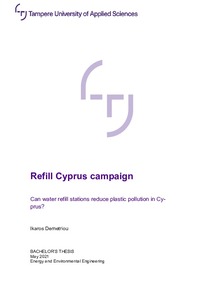Refill Cyprus campaign : can water refill stations reduce plastic pollution in Cyprus?
Demetriou, Ikaros (2021)
Demetriou, Ikaros
2021
All rights reserved. This publication is copyrighted. You may download, display and print it for Your own personal use. Commercial use is prohibited.
Julkaisun pysyvä osoite on
https://urn.fi/URN:NBN:fi:amk-202105057232
https://urn.fi/URN:NBN:fi:amk-202105057232
Tiivistelmä
The Mediterranean Sea is one of the most polluted seas in the world, with thousands of tons of plastic released into it each year. This poses great risks to the ecosystem of the area, including Cyprus. Studies showed that microplastics have infiltrated turtle nesting sites in Northern Cyprus, confirming plastic pollution as a concrete threat to the island. The objective of this thesis was to examine whether water refill stations are a viable measure against plastic pollution.
The NGO Let’s Make Cyprus Green launched the RefillCyprus campaign with the goal being the reduction of single-use plastic water bottles. So far one refill station was successfully installed on the Yermasoyia seafront. A survey was conducted through social media to gather information from residents and frequent tourists of the area about their general knowledge of plastic pollution and their opinion on water refill stations. The goal of the survey was to get feedback on the refill stations and determine their effectiveness.
The results suggest that the groups that use more single-use plastic water bottles and are less aware of the repercussions are more likely to use water refill stations. This may indicate the effectiveness of refill water in the reduction of plastic litter. The respondents believe that raising awareness regarding plastic pollution and stricter regulations and fines against littering would help decrease plastic litter.
The NGO Let’s Make Cyprus Green launched the RefillCyprus campaign with the goal being the reduction of single-use plastic water bottles. So far one refill station was successfully installed on the Yermasoyia seafront. A survey was conducted through social media to gather information from residents and frequent tourists of the area about their general knowledge of plastic pollution and their opinion on water refill stations. The goal of the survey was to get feedback on the refill stations and determine their effectiveness.
The results suggest that the groups that use more single-use plastic water bottles and are less aware of the repercussions are more likely to use water refill stations. This may indicate the effectiveness of refill water in the reduction of plastic litter. The respondents believe that raising awareness regarding plastic pollution and stricter regulations and fines against littering would help decrease plastic litter.
